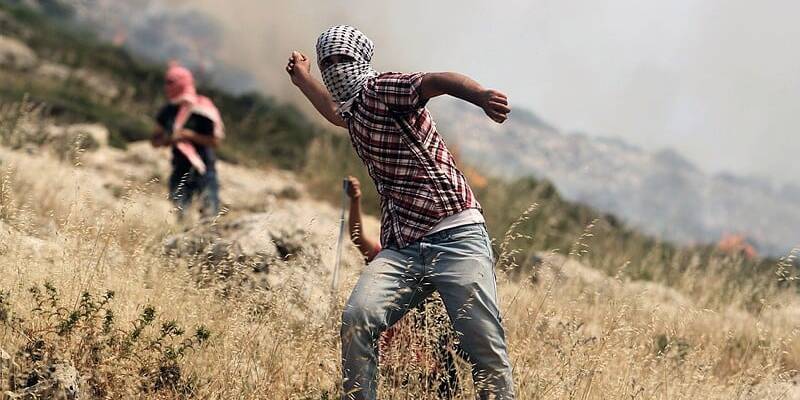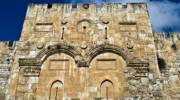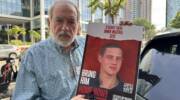When the terrorists tried to flee by car, Jabbar was reportedly hit by a bullet, causing the escape vehicle to overturn.
By Akiva Van Koningsveld, JNS
U.S. National Security Council Spokesman John Kirby on Monday extended Washington’s “deepest condolences” to the family of a Palestinian-American who was reportedly killed after stoning Israeli vehicles.
“Certainly a tragic killing by all accounts that we’ve been able to glean so far,” Kirby said of the Jan. 19 death of Tawfic Abdel Jabbar, a resident of Al-Mazra’a Ash-Sharqiya near Ramallah.
“Our deepest condolences go to the family. He was 17 years old, just a teenager, so our thoughts and prayers are certainly with the family,” Kirby continued, demanding a “full, thorough, transparent investigation.
The Biden administration has “every expectation that those responsible for it will be held properly accountable,” Kirby added.
On Saturday, the U.S. Office of Palestinian Affairs, whose offices are located at the American Embassy to Israel in Jerusalem but which is a separate institution, said it was “devastated” to hear about Jabbar’s death. Its head, George Noll, visited the family to offer his condolences.
“We call for an urgent investigation to determine the circumstances of his death,” tweeted the Palestinian Affairs office on Jan. 20.
Devastated to hear about the killing of a 17 year old U.S. citizen, Tawfic Abdel Jabbar. We call for an urgent investigation to determine the circumstances of his death.
— U.S. Office of Palestinian Affairs (@USPalAffairs) January 20, 2024
In a statement shared with JNS on Tuesday, the Israel Police acknowledged reports of the “firearm discharge, ostensibly involving an off-duty law enforcement officer, a soldier, and a civilian.”
The statement did not say who opened fire, but police said the shooting “was directed towards a perceived threat, individuals purportedly engaged in rock-throwing activities along Route 60,” the main north-south highway in Judea and Samaria.
“Additional information indicated the potential fatality of a 17-year-old Palestinian due to gunfire. A comprehensive investigation has been launched by law enforcement to examine the circumstances surrounding the incident,” the statement concluded.
Earlier Arabic media reports, including in the London-based outlet Al-Araby Al Jadeed and Palestinian website Ultrapal, cited eyewitnesses who confirmed Jabbar had been part of a group throwing rocks at passing cars on Route 60 near Ofra, just south of Jabbar’s hometown.
An Israel soldier or civilian opened fire in self-defense, the reports suggested. When the terrorists tried to flee by car, Jabbar was reportedly hit by a bullet, causing the escape vehicle to overturn.
Jabbar’s mother, Mona Ajaq, told Al-Araby Al Jadeed on Monday that her son was “always talking about martyrdom.” Since the family returned to Samaria from the U.S. a year and a half ago, he regularly attacked Jewish drivers in the area of Wadi Haramiya, she noted.
“Tawfic was an outstanding student in school, and he hoped to become an engineer, but he obtained the greatest certificate in the world by his martyrdom,” Ajaq said.
Video footage of the funeral procession in Al-Mazra’a Ash-Sharqiya showed armed terrorists carrying automatic rifles, as well as a Kalashnikov rifle placed on Jabbar’s body.
“The door of Al-Aqsa is made of iron—only a martyr can open it,” mourners can be heard chanting in videos posted online, in addition to chants in favor of Hamas‘s Al-Qassam Brigades “military” wing, responsible for the Oct. 7 massacre of some 1,200 people in the northwestern Negev.
Hamas mourned Jabbar’s death, although the terrorist organization did not explicitly claim him as a member or operative.
أهالي بلدة المزرعة الشرقية شمال شرق رام الله وسط الضفة الغربية المحتلة جثمان الشهيد الفتى توفيق حافظ عجاق صاحب ال١٧ عاما إلى مثواه الأخير pic.twitter.com/2EL5LcMKDk
— قناة فلسطين اليوم (@Paltodaytv) January 20, 2024
When presented with the evidence of Jabbar’s alleged terrorist activities by JNS, the U.S. Office of Palestinian Affairs did not immediately offer comment.
Between Oct. 7 and Jan. 15 alone, the Hatzalah Judea and Samaria rescue group recorded more than 2,600 terrorist attacks against Israelis in the area, including 760 cases of rock-throwing, 551 fire bombings, 12 attempted or successful stabbings, and nine vehicular assaults.
Do You Love Israel? Make a Donation - Show Your Support!
Donate to vital charities that help protect Israeli citizens and inspire millions around the world to support Israel too!
Now more than ever, Israel needs your help to fight and win the war -- including on the battlefield of public opinion.
Antisemitism, anti-Israel bias and boycotts are out of control. Israel's enemies are inciting terror and violence against innocent Israelis and Jews around the world. Help us fight back!























